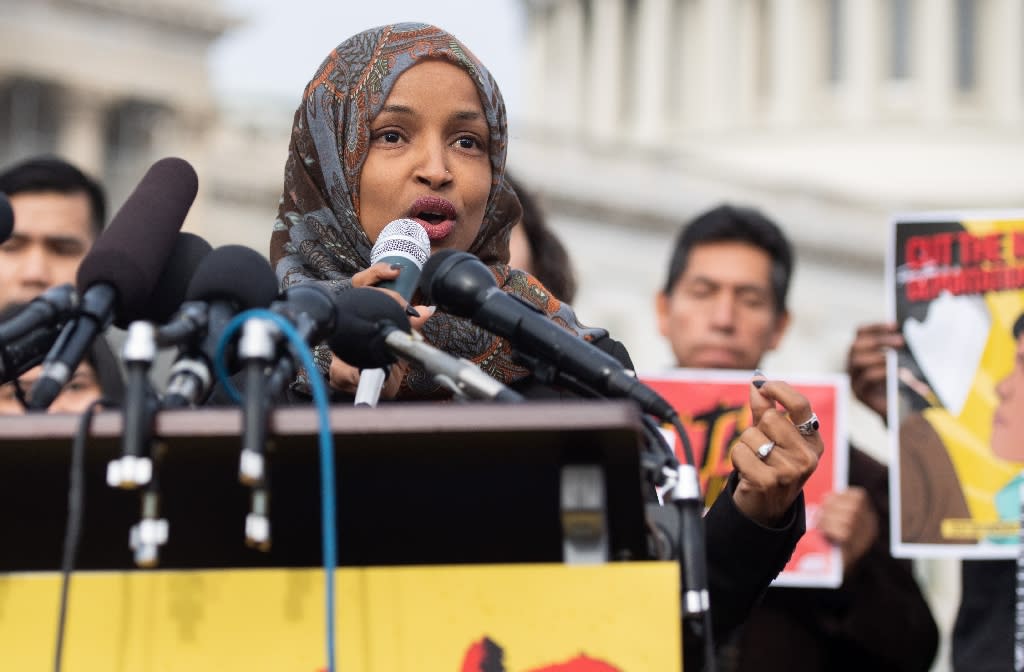The politically correct attack on Ilhan Omar

There’s a phrase for the attack on Rep. Ilhan Omar that’s on the tip of my tongue, and if you give me a minute I’ll think of it.
Omar, the freshman Democrat from Minnesota, was guilty, in the eyes of President Trump, various Republicans in Congress and those guardians of civil discourse, the editors of the New York Post, of failing to show proper deference in discussing the attacks of 9/11. What she said, in a speech last month to the Council on American-Islamic Relations, a Muslim civil-rights organization, was that CAIR “was founded after 9/11 because they recognized that some people did something, and that all of us were starting to lose access to our civil liberties.” (She was mistaken about the year CAIR was established — it was 1994 — but her intended point, that 9/11 was a seminal moment for the organization, was correct.)
Her critics focused on her use of the phrase “some people did something,” rather than the Republican-approved description of 9/11 as “a horrible attack by radical Islamist terrorists on the United States, leading to the deaths of thousands of innocent civilians and heroic first responders.” Which is accurate, and it would probably help Omar get past the episode if she said as much. But in the context of her remarks, “some people did something” was clearly meant to signal her own distance from the attacks — she was 19 years old and living in Minnesota, a refugee from Somalia and a naturalized U.S. citizen — and the unfairness of being stigmatized, along with all other American Muslims, for what “some people” did.
I’m trying to think of the term for that kind of enforcement of rigid norms of discourse. Factional decorum? No, that’s not it. Ideological propriety? Don’t think so.
Obviously, almost from the moment they occurred, the attacks of 9/11 have been used to score political points, not always in what one might consider good faith. The party now attacking Omar nominated and renominated an administration that used those attacks as a pretext to launch a war against Iraq, which even the current Republican president has described as a disaster. New York’s mayor at the time, Rudy Giuliani, cited his leadership in the aftermath as his prime credential in his 2008 presidential campaign. (It was Joe Biden, a candidate for the Democratic nomination, who memorably described Giuliani’s speeches as consisting of “a noun, a verb and 9/11.”)
During his own campaign, Trump claimed to have seen on television “thousands and thousands of people” in Muslim neighborhoods in New Jersey “cheering as those buildings came down,” something that by all evidence never happened.
And while Omar’s reference to “some people” may have come across as unacceptably vague, evangelists Jerry Falwell and Pat Robertson were outspoken in pinning the blame for 9/11 on those they considered the real perpetrators, “the pagans, and the abortionists, and the feminists, and the gays and the lesbians who are actively trying to make that an alternative lifestyle, the ACLU, People for the American Way.” These people, Falwell said on Robertson’s television broadcast, just days after 9/11, brought about the calamity by making God mad at the United States.
“All of them who have tried to secularize America, I point the finger in their face and say, ‘You helped this happen,’” Falwell continued, to which Robertson responded, “I totally concur.”
Let me be clear: Falwell and Robertson are entitled to their beliefs, preposterous though they might be, and even if they quickly (and unconvincingly) disavowed them once they circulated beyond the friendly confines of the Christian Broadcasting Network. But Omar’s failure to focus-group test her description of 9/11 left her open to the kind of attack that is becoming all too common in America, from both ends of the ideological spectrum. Language is increasingly deployed in the service of advancing an argument rather than conveying meaning.
On the activist left it is impermissible to speak of the Palestinians except in the context of their oppression by Israel; the fact that some Palestinians are terrorists goes unmentioned. The “crisis of incarceration” in some communities is discussed as if it were a unitary, impersonal phenomenon, unrelated to the reasons some people are incarcerated. These are not simple issues. The Palestinians are indeed oppressed, and some jurisdictions jail people for stupid or venal reasons, such as minor drug possession or not paying a traffic fine. But when we insist they can only be discussed through an ideological lens — the reverse, in this case, of the lens conservatives have turned on Omar — we make reasoned discourse more difficult.
In fact, I think I have figured out how to refer to the attacks on Omar.
It’s coming back to me now: it’s “political correctness.”
_____
Read more from Yahoo News:


